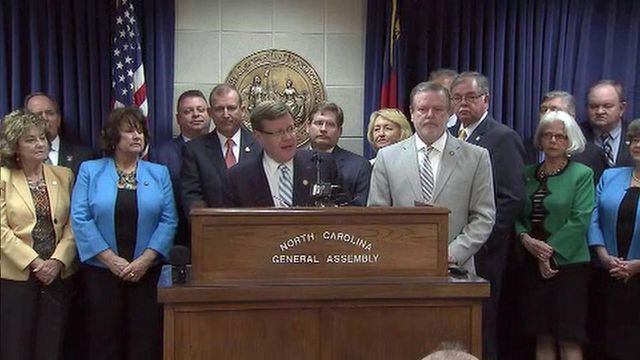Budget deal includes sales tax, Medicaid reform
Legislative leaders on Monday unveiled details of their compromise $21.7 billion spending plan for 2015-16 - 76 days after it was due.
Posted — UpdatedThe state budget resolves conflicts between the House and the Senate over education funding, Medicaid reform and sales tax distribution, and House Speaker Tim Moore and Senate President Pro Tem Phil Berger both expressed confidence at getting the budget passed and signed into law by a Friday deadline.
"We recognize that we've been here a while," Moore, R-Cleveland, said during a news conference. "We've dealt with a lot of chronic problems (where) the can's been kicked down the road for decades."
The Senate has scheduled its first vote on the budget – two votes on separate days are required in both the House and the Senate – on Tuesday, which rankled Democrats.
"This process has been an absolute disgrace to the taxpayers of this state," Senate Minority Leader Dan Blue said in a statement. "Legislators and the public alike will have less than 24 hours to read and digest a final budget that is expected to be well over 500 pages and will drastically affect the livelihood of the state over the coming two years. With all negotiations taking place behind closed doors, one has to wonder what the budget writers are hoping to hide from the public."
Although Berger and Moore outlined their spending plan Monday afternoon, the actual documents – expected to total hundreds of pages – were not expected to be available until late Monday or early Tuesday.
The House cannot vote on the budget until Thursday and Friday. Under the chamber's rules, the budget must be available to the public for three legislative days before any vote can be taken.
The budget increases state spending by 3.1 percent overall – far higher than the Senate originally wanted – but Berger, R-Rockingham, boasted that it cuts the tax burden on North Carolina residents by a combined $400 million.
The tax cuts include lowering the personal income tax rate from 5.75 percent to 5.499 percent in 2017 and expanding the so-called "zero bracket" in which people pay no income tax from the first $15,000 of income to $15,500 for married filers next year.
But people would soon have to pay sales tax on product installation and warranties under a provision in the budget. Sales taxes on services such as veterinary care, which had been proposed earlier this year, weren't included in the budget.
"I think what you've got to do is look at the overall package with reference to taxes, and the overall package represents a net tax cut for the people of North Carolina," Berger said.
Lawmakers also backed off from a Senate plan to change how sales tax revenue is distributed. The existing system in which 75 percent goes to the county where a purchase is made and the other 25 percent is distributed statewide based on population will remain in effect. Instead, the money from expanding the sales tax base to some services will go to help rural counties that don't fare as well under the current distribution system.
The budget includes $225 million over two years to reform the Medicaid program. Cost overruns in Medicaid, which provides health coverage for more than 1 million poor and disabled North Carolinians, have been a budget problem for years, but the House and the Senate have long disagreed on how to move Medicaid from a fee-for-service system into more of a managed care operation.
Moore said the restructuring has been agreed to in a separate bill that likely will be debated next week.
The budget provides $750 bonuses to state employees and most teachers. Starting teachers will see their salaries increased to $35,000 under a two-year plan that started in 2014-15, and step increases for teachers and others on the state salary schedules are also funded.
State retirees will see no cost-of-living increase, however.
All current teacher assistant positions will continue to be funded in the budget, but Berger said state money for TAs must be used solely for TAs. House negotiators had wanted to provide school districts more flexibility to use money as needed.
State funding for driver's education also has been restored for the next two years.
Moore said spending on K-12 education goes up by $410 million in the budget, while the University of North Carolina system would receive another $99 million and community colleges another $20 million.
The following are other aspects of the budget proposal:
- A $2 billion bond proposal that Gov. Pat McCrory has been pushing for months to upgrade state buildings and other infrastructure will be put before voters next year. The bill providing details on the referendum is expected to be debated next week. That statewide vote will either take place during the March presidential primary or the November general election.
- A tax deduction for medical expenses will be restored. It had been eliminated as part of a 2013 tax reform package, causing many seniors to see their total state taxes go up.
- The tax credit for preserving old warehouses and other historic properties has been extended. It had expired at the end of 2014, but McCrory and local officials had lobbied for its continuation.
- The Opportunity Scholarships school voucher program would be expanded by $14 million over two years, more than doubling the $10 million set aside for its first year in 2014-15.
- Fees will be increased at the state Division of Motor Vehicles.
- The Job Development Investment Grant program, which is designed to lure large businesses such as auto manufacturers to the state, will be expanded, and the state will provide electricity tax breaks for data centers and jet fuel tax breaks for airlines.
- Tax credits for renewable energy projects that are scheduled to end this year won't be extended.
- The North Carolina Zoo, state parks and state aquariums will be moved from the Department of Environment and Natural Resources to the Department of Cultural Resources.
- Victims of the state's former eugenics program will receive a second compensation payment of $15,000 each. They already have received $20,000 each.
- No changes will be made to the state's certificate of need system requiring state approval before health care facilities can expand or purchase major pieces of equipment.
- A state Department of Information Technology will be created.
"The governor would like to thank the members of the General Assembly for their hard work and public service," McCrory spokesman Josh Ellis said in an email to WRAL News. "The governor and his team will thoroughly review the proposal to ensure it is fiscally responsible and aligns with our state's priorities in key areas that the governor has championed, including job creation, education, health care and transportation."
Related Topics
• Credits
Copyright 2024 by Capitol Broadcasting Company. All rights reserved. This material may not be published, broadcast, rewritten or redistributed.





